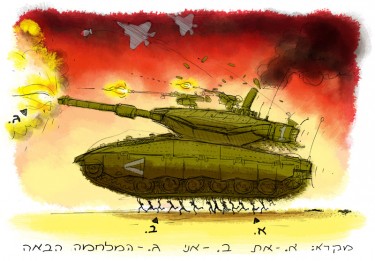 Cartoon of The Defense Budget by Amitai Sandy. Used with permission. Text from right-to-left: A-You, B-Me, C-the next war.
Cartoon of The Defense Budget by Amitai Sandy. Used with permission. Text from right-to-left: A-You, B-Me, C-the next war.
One of the major results of the social justice protests in Israel in the last year has been a renewed debate about the budgetary priorities of the state. The social justice movement (also known as #j14) demanded a more equal distribution of wealth in Israel, including funneling a greater share of the budget to welfare services for the population such as subsidized housing, free education, and better medical services, at the expense of current budgetary priorities – namely, the defense budget.
Blogger Tomer Israeli [he] explained the logic shared by many #j14 protesters:
“Only if we really decrease this share of the budget [the defense budget] will we be able to increase it [the budget] in other places. Otherwise, we’ll keep chasing our own tail and pulling the short blanket from side to side. Do we have an opinion on the budget? Because if we don’t have an opinion, this means that we don’t have a real direction and a way to change the priorities in the country.”
Blogger Ziv Turner [he] blasted the current Israeli government for managing to simultaneously collect heavy taxes from the population that struggles to make ends meet, while increasing the deficit and not providing the population with adequate services. He writes:
“The defense budget is the biggest lie of all lies in Israel. A rich and bloated army, with numerous arms and commanders, but without long-term thinking. We don’t have enemies around us who can annihilate us, who threaten our existence. We are left with Nasrallah and Iran. For this we don’t need such a bloated army.”
Writing in the blog +972 Magazine, Timna Axel discussed the influence of the defense budget and the occupation of the Palestinian territories on social inequality in Israel:
“And then there is the slashing of social expenditures in the budget, which during the second Intifadah totaled NIS 65 billion, while the defense budget increased by NIS 15 billion. Cuts to child allowances and unemployment pay have caused a consistent rise in the poverty rate, and government income transfers designed to combat it make an even smaller dent in poverty now than they did in the 1980s. The report quotes economist Momi Dahan, who writes that “an in-depth analysis of the factors causing Israel to have more poor than any other developed country cannot overlook the fact that Israel spends seven percent of its GDP on defense, compared with 1.5 percent on average in the other developed countries.”
Blogger Yuval Ron, on the other hand, saw the settlements in the occupied Palestinian territories as a way to decrease the defense budget, writing:
“The largest part of the state’s budget is the defense budget. The defense budget is so large that it delays or prevents important government actions on other necessary issues. The defense of the borders by the army alone, without the settlements, would place a very heavy burden on the army, both in terms of manpower and money. The existence of the settlements along the border make it easier for the army to perform its defensive actions and saves the state manpower and significant sums of money.”
For further information on the topic, please view the following publications from our partners:
The Sacrifice Ahead: The 2012 Defense Budget, from the Center for a New American Security (CNAS), Washington, DC, United States.
Public Finance and National Security: Deficit Reduction and the American Military in a Time of Diminished Resources, from the Institute for Defence Studies and Analyses (IDSA), New Delhi, India.
The US on an Israeli Military Strike against Iran: A Change in Position?, from the Institute for National Security Studies (INSS), Tel Aviv, Israel.
For more information on issues and events that shape our world please visit the ISN’s Security Watch and Editorial Plan Dossiers.

